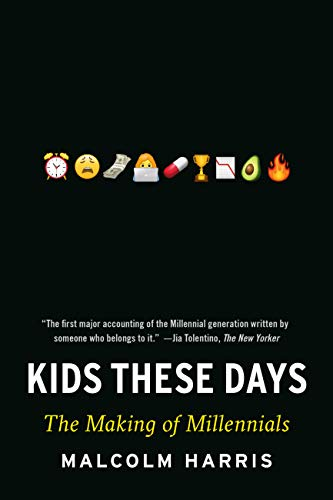Kids These Days: Human Capital and the Making of Millennials

from amazon.com
Millennials have been stereotyped as lazy, entitled, narcissistic, and immature. We've gotten so used to sloppy generational analysis filled with dumb clichés about young people that we've lost sight of what really unites Millennials. Namely:
- We are the most educated and hard-working generation in American history.
- We poured historic and insane amounts of time and money into preparing ourselves for the 21st century labor market.
- We have been taught to consider working for free (homework, internships) a privilege for our own benefit.
- We are poorer, more medicated, and more precariously employed than our parents, grandparents, even our great grandparents, with less of a social safety net to boot.
Kids These Days, is about why. In brilliant, crackling prose, early Wall Street occupier Malcolm Harris gets mercilessly real about our maligned birth cohort. Examining trends like runaway student debt, the rise of the intern, mass incarceration, social media, and more, Harris gives us a portrait of what it means to be young in America today that will wake you up and piss you off.
Millennials were the first generation raised explicitly as investments, Harris argues, and in Kids These Days he dares us to confront and take charge of the consequences now that we are grown up.
https://www.amazon.com/Kids-These-Days-Capital-Millennials-ebook/dp/B06XFTVQFK
Author: Malcolm Harris

Reviewed by: John Stokdijk

In June of 2018 I went to Nova Scotia to visit my mother, other family and friends. I did not have enough time to visit everyone but I made a special effort to see one of my favorites, Gabrielle Greener, my older sister’s granddaughter.
At age 16 she visited me in Calgary although neither of us remember why. We had some wonderful conversations which were different from most I have with my relatives. Amongst all of my mother’s great grandchildren, Gabrielle is probably the most intelligent in the sense of raw brain power. As a teenager she already displayed an intellectual curiosity and a love of learning. The Stokdijk Family leans more towards doing rather than thinking so my conversations with Gabrielle were a refreshing change.
When I expressed my desire to better understand her and her generation, she recommended that I read Kids These Days - The Making of Millennials by Malcolm Harris.
I have no children of my own and I have had little opportunity for meaningful interaction with Millennials. This book helped me to begin to grasp the vast differences between my generation, the Baby Boomers, and Gabrielle’s generation, the Millennials. It is important but difficult to see the world through the eyes of others and this was an eye opening experience for me.
Malcolm Harris is himself a Millennial, a writer who did considerable research to support the premises in his book. He seems to have some deep insights as well as a distinct personal perspective. I will have more to say about him after I have commented on his book.
In his Introduction, Harris outlines some of his themes.
Over the past forty years we have witnessed an accelerated and historically unprecedented pace of change… The rate of change is visibly unsustainable… The growth of growth requires a different kind of person…
This is not a new idea. When I was about Gabrielle’s age I read Future Shock by Alvin Toffler. As a Baby Boomer I have witnessed constant change. But something seems different now. We Baby Boomers struggled to keep up with change and most of us did most of the time. Today we continue to see the pace of change accelerate and it seems self-evident that accelerating change is unsustainable. My generation was often stressed by change but also mostly excited by it. Millennials, on the other hand, have an understanding that change has reached problematic levels. The idea that the pace of change can exceed the human capacity to cope has been discussed for many years. The Millennials may be the generation that provides a case study that defines the breaking point and its consequences.
Harris clearly has a attitude towards capitalism that is the opposite of mine as a young man.
…capitalism emerged as the single dominant mode of organizing society… Lately, this system has started to hyperventilate… It’s desperate to find anything that hasn’t yet been reengineered to maximize profit, and then it makes those changes as quickly as possible… Millennials know it better as “the world,” or “America,” or “Everything.” And Everything sucks.
As a teenager I read and was greatly influenced by Ayn Rand. In my youth I was quite conservative in my political views and I was a strong believer in the power of free markets to create much benefit for the greater good of society. After a brief flirtation with rebellion in the 1960s, I and most Baby Boomers quickly became part of the mainstream. We supported the system and we benefited from it.
As a young man I had little doubt that financially I would do better than my father. As a generation we were optimistic and for good reasons. Although in hindsight my expectations were unrealistically high, I did okay and have lived a materialistically comfortable life. It is only in recent years that I have begun to question the system which served me so well. But now I find it easy to understand the point of view of Harris.
Malcolm Harris also highlighted a third difference between mine and his generation that had not occurred to me previously.
The result is a generation of children with an unprecedented lack of unsupervised time who have been systematically denied the chance to build shelves without adult oversight… Young people feel— reasonably, accurately— less in control of their lives than ever before.
Growing up, I had a lot of unsupervised time, a lot of play time without adults around. I grew up with a lot of freedom, perhaps too much. We could disappear for hours and no one worried. I fondly remember browsing bookstores and buying whatever book I wanted. I remember my mother once telling me to read more books suitable for a teenager rather than the serious material I was drawn to. I never felt what Harris expresses, a feeling of being controlled and manipulated.
Another interesting difference between our generations is how we perceive competition.The world I faced as a youth seemed to be a world with lots of opportunity for almost everyone. I certainly had no concept that by pursuing my goals I was somehow taking away opportunities from my peers.
But to reap the rewards, you’re going to need to beat almost everyone else just like you.
A long hard look at the historical circumstances that have birthed Millennials can tell us more about our nature than any number of snapshot trend pieces or shallow surveys. The only way to understand who we are as a generation is to look at where we come from, and the social and economic conditions under which we’ve become ourselves.
Malcolm Harris develops his themes in great detail and in chapters 1 and 2 he discuss education. Again, I am struck with the magnitude of the difference from my experience over fifty years ago. But I do not disagree with some of his conclusions.
This is the central problem with an education system designed to create the most human capital possible: An en masse increase in ability within a competitive system doesn’t advantage all individuals.
There probably aren’t many parents, teachers, or even politicians who consciously decide they want to raise bored children and young adults who have trouble controlling their emotions. Yet these are the consequences of their actions.
If it is every parent’s task to raise at least one successful American by America’s own standards, then the system is rigged so that most of them will fail.
I believed that I and my generation could succeed if we had the motivation and put in the effort to do so. And most of us did. I never felt that my efforts would benefit others more than myself.
But since midlife I have been quite critical of one trend in education which was very apparent in Alberta. Education has increasingly shifted towards developing employees as Harris describes. Education should, in my opinion, firstly, prepare students to succeed at life in all of its dimensions and secondly, prepare students to be good citizens.
Chapter 3 is entitled Work (Sucks). My attitude towards work was that it was a necessary means towards an attainable goal. We were turned on by our potential and it is difficult for me to grasp that perhaps a whole generation is turned off, and perhaps justifiably so.
Across the economy, bad jobs are getting worse, good jobs are getting better, and the middle is disappearing... As Millennials enter the workforce, we’ve faced a set of conditions that are permanently different than what previous generations have experienced… both good and bad jobs are less secure.
all that work in childhood seems motivated more by fear of a lousy future than by hope for dignity, security, and leisure time.
Again, this is the opposite of my attitude when I was in my twenties.
In Chapter 4 Malcolm Harris discussed the decisions made by government and the impact on Millennials.
In their 2014 reports, the Social Security trustees themselves estimate that by 2020 outgo will exceed total fund income; by 2033 the reserves will be totally depleted and new tax revenue will only cover 77 percent of scheduled benefits. Americans who retired in the 1980s received twice as much in benefits as they paid taxes into the system, but the ratio has been declining ever since. If the feds can only pay out 77 percent, Millennials will end up paying more into the system than they get in benefits.
This issue has been in the news often but rarely is it presented through the eyes of Millenials. Their disgust with this state of affairs is justified and understandable. But their voice is generally not being heard.
The final chapter of Kids These Days focus on a word that is becoming more important with each passing day: trust.
In March of 2014, Pew Social Trends published the results of a survey taken between 1987 and 2012 on whether or not “generally speaking, most people can be trusted,” broken down by generation. 1 The Silent Generation was able to pass most of their trust to the Baby Boomers, but Gen X took the first half of the 1990s hard, dropping all the way to 20 percent before edging up over 30 percent by the end of the survey period. But if Gen Xers are more cautious than their parents, Millennials are straight-up suspicious… Generalized trust is a privilege of the wealthy few for whom the stakes aren’t so high, those who are so well-off they can feel secure even in a human-sized rat race. For everyone else, the modern American condition includes a low-level hum of understandable paranoia and anxiety. That’s a cost too.
For a short time as a teenager I was caught up in the rebellion of the 1960s. The idea to not trust anyone over the age of 30 resonated strongly with me. I was unimpressed by the world created by my parents’ generation. That feeling quickly changed for me and most Baby Boomers.
Our generation has been criticized as the sellout generation. We did not stay true to the spirit of the 1960s. The hippies became yuppies. The real story is of course much more complex. It is as important for the Millenials to see through Baby Boomer eyes as it is for us to see through their eyes.
The Conclusion in Kids These Days is very pessimistic and includes a section which is entitled Seven Signs of the Bad Future. It is hard to disagree with Harris. As we approach the end of 2018, I am less optimistic than I have been for a long time. I wonder whether in the years of life I have left I will find reasons for optimism. This glimpse into the Millennials does not inspire me with much hope.
If we keep going the way we are now, if we extend out the graphs for another few decades, some seriously wild shit will happen.
Kids These Days - The Making of Millennials by Malcolm Harris was a book that had escaped my notice until Gabrielle brought it to my attention. I had never heard of Malcolm Harris so I decided to do some research. Who he is has significance in understanding his book.
When I googled Malcolm Harris I got 28,400,000 results. But from experience I knew that scanning the first three pages of results would be sufficient for my research. However, I realize that my research is very incomplete.
At the top of the results was a link to his Twitter account where I learn that he has 15,934 followers, not insignificant but not very impressive.
Next I noticed a review of the book on the Los Angeles Review of Books, a source I respect Won’t Get Fooled Again: Malcolm Harris’s “Kids These Days: Human Capital and the Making of Millennials” The review was written by someone who is also a Millennial and adds some interesting nuances. The storyline presented by Harris is incomplete but that is unavoidable with most topics. The review captures something that was not completely obvious in the book. But it supports my intuitive feeling that western society is at a significant turning point for better or worse.
We will either become “the first generation of true American fascists” or “the first generation of successful American revolutionaries.”
Kids These Days is also a very white book, in ways that it might not have been if not for Harris’s insistence on capturing the experience of a monolithic millennial cohort.
Ultimately, though, the most frustrating thing about Kids These Days is how Harris keeps coming back to that broken promise framing, encapsulated in those blunt rhetorical questions quoted above: “[T]he market hasn’t held up its side of the bargain. What gives? And why did we make this bargain in the first place?” As a millennial might say, great questions.
I also noticed a post by Harris on reddit where I learned something significant about him. Malcolm Harris has revolutionary leanings, but his book is reasonable, not a radical manifesto. There are questions which come to mind that I would like to ask Gabrielle.
...I think the US political system as it currently exists must be swept from the face of the earth.
I'm a communist, but Marx calls communism the "real movement which abolishes the present state of things." I like that; he's not doing like speculative fiction about the future society, its shape emerges from revolutionary struggle. There is a lot we can learn about revolutionary struggle though!
… the American project is a mistake and it's up to us (cohort-wise) to bring it to an end. I think the Left needs to learn a lot more from indigenous/ndn theorists about how to envision this continent of land without America.
I decided to have a look at some of the articles published by Harris. The first article I found was an interview of him on the Pacific Standard website where some of his articles are published HOW MILLENNIALS BECAME CONVENIENT SCAPEGOATS FOR A CHANGING SOCIETY. From this article I learned that Malcolm Harris was involved with the Occupy Wall Street movement and that it was predominantly a Millennial movement.
In 2011 I was aware of the Occupy Wall Street movement but did not follow events closely. I was aware and proud of the movements Canadian roots and Adbusters was a magazine that I picked up from newsstands occasionally. I thought that “We are the 99%” was a powerful slogan. I have been puzzled why this movement so quickly lost its energy. Now I looked for what role Malcolm Harris played.
My research informs me that Malcolm Harris was one of 700 people arrested on the Brooklyn Bridge after being warned to stay off the street. The following year at the age of 23 he plead guilty. He was not a major player in the Occupy movement.
It is my intention to pay more attention to Millennials in the future. With my curiosity aroused, I decided to have a look at the Pew Research Center. I read one article The Generation Gap in American Politics and it gave me a glimmer of hope.
From immigration and race to foreign policy and the scope of government, two younger generations, Millennials and Gen Xers, stand apart from the two older cohorts, Baby Boomers and Silents. And on many issues, Millennials continue to have a distinct – and increasingly liberal – outlook.
Just 27% of Millennials approve of Trump’s job performance, while 65% disapprove,...
After scanning several pages of Pew Research articles about Millennials I did not see anything addressing what to me is a key question: What percentage of Millennials reject a capitalist system? As Millennials age I will look for an answer to another question: Will Millennials become revolutionaries or will they, like the Baby Boomers, also sellout?
Thank you, Gabrielle, for leading me down this path.
